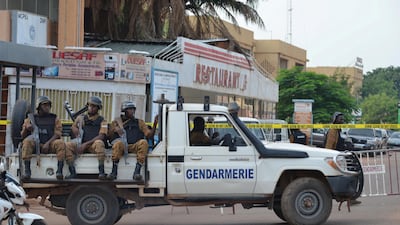The attack on a church in northern Burkina Faso on Sunday, in which up to 30 gunmen killed six worshippers, is just the latest incident in a worrying rise of violence and extremism in the Sahel.
While the global battle against terrorism has largely been focused on ISIS, whose so-called caliphate in Iraq and Syria grew to roughly the size of Britain at its peak, militancy has been growing in Mali, Mauritania, Chad, Niger and Burkina Faso, with limited and largely futile attempts to curb its growth.
In the past decade, thousands of people have been killed by a range of extremist groups while another 4.3 million have been displaced. This grim conflict has not received nearly enough worldwide attention but it is time for the world to wake up to the threat.
In the Sahel region, which stretches from Senegal in West Africa to Eritrea in the east, Burkina Faso has become a new frontier in the past few years.
The country, which has a history of religious groups peacefully coexisting, has witnessed two deadly attacks on churches in the past fortnight. The slaughter of worshippers and priests might have made headlines but, as one analyst told The National, there have been "more than 20 attacks in the past month alone".
Overall, militant attacks in Burkina Faso soared from 12 in 2016 to 158 last year. Meanwhile ISIS has stepped up its propaganda operations in the country and in rare footage last month, ISIS leader Abu Bakr Al Baghdadi accepted an oath of allegiance from a Burkinabe affiliate. Other groups, including Ansarul Islam and Islamic State in the Greater Sahara have been active in the region.
Nevertheless, of the African countries which make up the G5 Sahel anti-terrorism force, Burkina Faso is seen as a more stable partner than, for example, neighbouring Mali. Earlier this month German Chancellor Angela Merkel pledged $51m in assistance to the country while the resignation of the entire Burkinabe cabinet in January, amid rising violence, exhibited a level of accountability that is almost unprecedented in West Africa.
The rest of the world must now step in to support Burkina Faso, and the under-equipped, underfunded G5 Sahel, in tackling militancy in the region, which risks destabilising other nations and displacing millions more to Europe.
It will not be easy, as a French hostage recovery operation – in which two French commandos died while rescuing four hostages – illustrated this week. The hostage takers were en route from Benin to Mali, through Burkina Faso, to hand the captives over to a Malian militant group. The operation offered a number of lessons, from the cross-border nature of Sahel militancy to the emergence of Burkina Faso as a new theatre of operations, and the capacity of a handful of militants to kill elite French soldiers.
As guerrilla wars across the Middle East have demonstrated, it is notoriously difficult to fight militants with little sense of self-preservation. The countries of the Sahel are trying to confront this growing threat – but they cannot do so alone.

